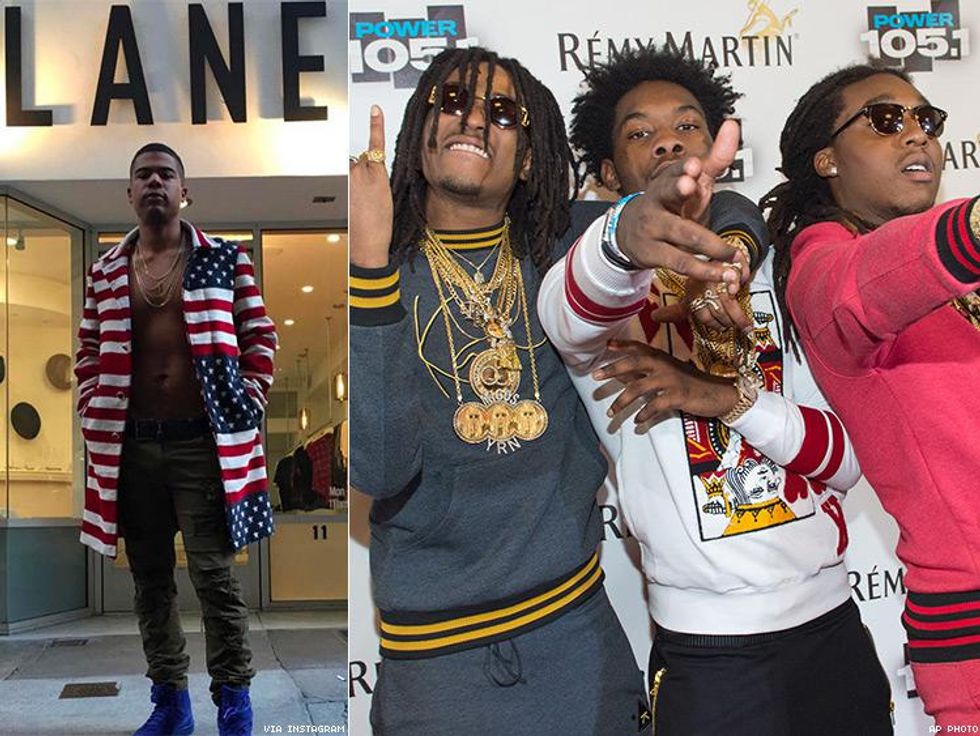
Migos' reaction to iLoveMakonnen's coming out is part of a bigger problem about queer representation in hip-hop.
FranciscoLWhite
February 13 2017 1:42 PM EST
May 26 2023 12:47 PM EST
By continuing to use our site, you agree to our Private Policy and Terms of Use.

Migos' reaction to iLoveMakonnen's coming out is part of a bigger problem about queer representation in hip-hop.
We should know better. As much as we love supporting our favorite rappers and trap artists, we’re usually thanked and met with homophobia that’s really unparalleled anywhere elsewhere in music. It happens time and time again, and that was proven once more with Migos, who in a recent interview with Rolling Stone's Jonah Weiner gave their opinion on “Tuesday” rapper Makonnen (also known by his stage name iLoveMakonnen) coming out:
"Damn, Makonnen!" Quavo bellows after an awkward interlude. I (Weiner) mention support I saw online for Makonnen's decision. "They supported him?" Quavo asks, raising an eyebrow. "That's because the world is fucked up," says Offset. "This world is not right," Takeoff says. "We ain't saying it's nothing wrong with the gays," says Quavo. But he suggests that Makonnen's sexuality undermines his credibility, given the fact that "he first came out talking about trapping and selling Molly, doing all that."
He frowns. "That's wack, bro."
Although some might say their response was more awkward than it was hateful, if we’re being real, Migos (the Migos?) are just small fish in a big stagnant pond. The real issue lies more with the culture and business surrounding the music. It’s not as if we needed further confirmation that hip-hop culture generally doesn’t see queer people. The only way to combat this problem is by supporting queer and trans rappers. With his highly publicized coming out, Makonnen actually joined a community at the margins of hip-hop, and it's these LGBT rap artists who we should be expecting anything from. Makonnen's coming out is a chance for him to change culture through his music.
Despite Rolling Stone suggesting that Migos are “not a political act—not in any explicit sense,” everything in these times has its political implications. This is especially the case for rap music and hip-hop culture at large, which has historically been a vehicle for resistance and liberation. Only in light of social media backlash, the trap trio has since attempted to clarify their initial statements on Twitter:
\u201chttps://t.co/4CQO4N2D5P\u201d— MIGOS\u2122 (@MIGOS\u2122) 1486591590
It’s not about political correctness but about artists’ words having actual impact. With queer and trans rappers outing themselves or just living openly in a genre and culture that’s excluded us, it would shift perspectives—particularly in the Black community. The social and political potential of that is why rappers like Angel Haze, Mykki Blanco, Cakes Da Killa, and now Makonnen are necessary and why they’ll become more relevant.
Our visibility and viability in rap music is important. The real gag is that rappers have been gay. Makonnen is not the first, and there are definitely others coming after him because of the way he’s now helping to pave. We just need to support those who identify with us, who affirm us, or who at the very least don’t get all problematic at the mention of “the gays.” We shouldn’t have to drag them into being affirming or just not being homophobic in their basic idea of what trap is or can be. Bye, Migos.
Want more breaking equality news & trending entertainment stories?
Check out our NEW 24/7 streaming service: the Advocate Channel!
Download the Advocate Channel App for your mobile phone and your favorite streaming device!
Francisco-Luis White is an Afro-Latinx writer, storyteller, and advocate residing in the District of Columbia.They contribute to various sites and have a collection of poetry forthcoming from Indolent Books in 2017.
Francisco-Luis White is an Afro-Latinx writer, storyteller, and advocate residing in the District of Columbia.They contribute to various sites and have a collection of poetry forthcoming from Indolent Books in 2017.